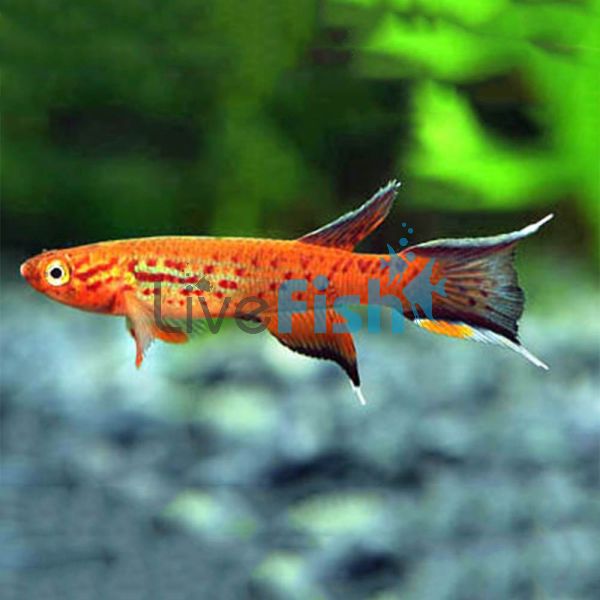Kap Lopez 3cm
- Buy 5 for $26.22 each and save 10%
- Buy 10 for $23.30 each and save 20%
Kap Lopez
The Aphyosemion Australe or the Kap Lopez killifish has got to be one of the most stunning, nano centrepiece fish and is arguably coloured species in the killifish family. This is a pretty easy to care for fish but they can be sensitive to parameter swings so it would be better to have this species on the bucket list once there is a decent level of experience gained with aquarium keeping. They are however incredibly vibrant and contrasting fish with fun personalities and are great for smaller aquariums as well. Kap Lopez killifish are also regarded to be an annual killifish in the wild meaning their entire lifecycle is completed in 1 year however in captivity they can live as long as 2 years. Due to their unconventionally short and seasonal lifespan, they also make for a great breeding project as well for aquarium fish breeders who are looking for the next fun project.
Kap Lopez killifish is most recognisable for its colouration and its vibrant gold colour is something you rarely see in the aquarium hobby for a naturally coloured fish. The base colour of this killifish is a stunning sunburst orange colour that has highlights of saffron red that present itself with spots and stripes across the body. From the pectoral fins to the ventral fin there is a streak of blue, green, and pink just for some added contrast. The Kap Lopez killifish is also commonly referred to as the lyre tail killifish due to the streamer-like extensions that are quite prominent on the tail. These highly vibrant fish are exclusive to male killifish. These killifish are a tropical species that will thrive in a temperature range between 24 - 26 degrees and will prefer softer water with a PH of 6.0-7.0.
Breeding these fish is relatively easy as males and females can be easily distinguished. Males are far more vibrant in colour compared to females and also tend to be larger. Females tend to be a more earthy colour with minimal patterning. Kap Lopez killifsh are an egg scattering fish and breeders will usually make spawning mops which are placed into the tank to capture the eggs. Females will deposit eggs into these mops as they resemble a fine-leafed plant. The mop can then be removed and placed into a dedicated breeding tank from where the fry can be raised.
Tank Recommendations for your Kap Lopez
The Kap Lopez killifish only reaches around 6 cm, and a pair can be kept in an aquarium of 40 litres. As these fish are almost exclusively top-dwelling fish, the choice of substrate or hardscape is not a major consideration. They will love a well-planted aquarium but the main must is a well-fitting lid since these fish are notorious jumpers. Kap Lopez killifish comes from slow-moving waters in the wild and it is best to avoid high-flow aquariums for them.
Suitable Tank Buddies
Due to their extremely peaceful behaviour, Aphyosemion australe is great to include in community aquariums with other similar-sized and tempered fish.
Usually Compatible
Khuli loach, pygmy corydoras, maculata rasboras, neon tetras, celestial pearl danios, and other nano species.
Sometimes Compatible
Larger community fish like angelfish can stress out the Austral killifish as these are delicate. It would be ideal to just avoid any species which would show even slight territorial behaviour or have the risk of being fin-nipping.
Rarely Compatible
Larger South American cichlids both aggressive and peaceful can easily outcompete or predate the Kap Lopez killifish.
Feeding your Kap Lopez
Kap Lopez killifish will take to aquarium foods very easily. They will take a wide range of floating pellets, flakes, and frozen foods. Giving them a the varied diet of some protein-rich micro pellets along with baby brine shrimp will ensure that they have optimal health.
| Scientific Name | Aphyosemion Australe |
|---|---|
| Care Level | Moderate |
| Common Names | Aphyosemion Australe Killifish, Gold Lyretail Killifish, Kap Lopez |
| Diet | Omnivore |
| Fish Family | Aplocheilidae |
| Lifespan (years) | 4 |
| Max. Length (cm) | 10 |
| Min. Tank Volume (l) | 70 |
| Origin | Africa |
| Reef Safe | Yes |
| Sociability | Peaceful |
| Venomous | No |
| Water Conditions | 24-26° C, pH 6.0-7.0 |




